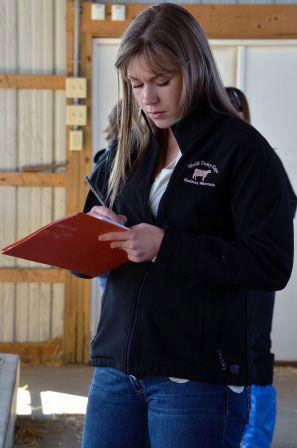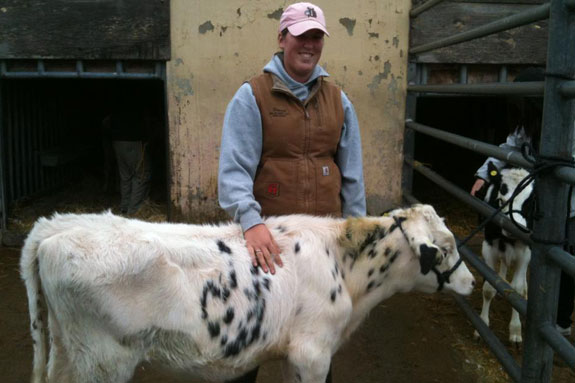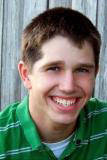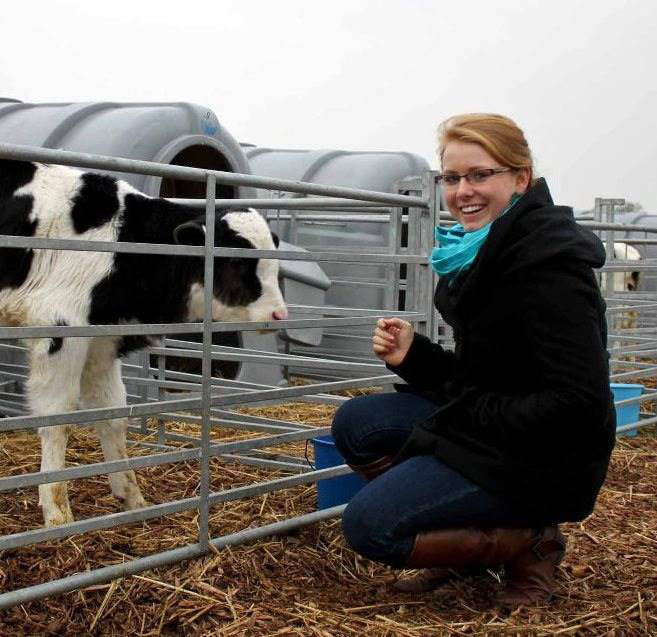This past April, leaders of the North American Intercollegiate Dairy Challenge launched the inaugural Dairy Challenge Academy to reach more students pursuing dairy careers. While 128 students competed in the 12th annual Dairy Challenge competition, an additional 100 students spent three days honing their dairy evaluation skills. Academy participants are able to do everything that the competing students are doing, including evaluation of a farm's financial, breeding, milk production and nutrition records.
They even work together in small groups to develop a summary of their findings and present it in front of all academy participants.
The difference is that the academy participants have several academy advisers, who are university and industry professionals, to guide them along the way.
"One of the unique things about this program is that the academy students have a coach with them every step of the way," says Progressive Dairy Solutions, Inc. CEO Matt Budine, who was one of the founders of Dairy Challenge and served as an academy adviser. "So not only are the students coached on how to evaluate the farms but also how to prioritze what they're seeing and how to breakdown the accompanying data."

Another difference is that the pressure of competing is removed from the equation, says 2013 academy participant Emilie Strand .
Progressive Dairyman reached out to Strand and several other academy participants to find out how the program prepared them for summer internship experiences.
A California native, Strand says she didn't grow up on farm but became interested in 4-H and FFA in high school and then attended Modesto Junior College.
She transferred to Cornell, where she'll graduate in 2014 in animal science with a dairy and agribusiness management emphasis.
The academy gave her the on-farm evaluation experience that she's already putting to practice now during her summer internship and hopes to apply to a career.
She's spending her summer as an Alta Advantage program intern with Alta Genetics. Her responsibilities include evaluating young-sire daughters and DNA testing.
Strand says she especially appreciated the opportunity to become more familiar with on-farm records and DairyComp.
"It was great to be able to get the practice necessary to prepare for real-world situations," she says.
Following her internship and graduation from Cornell, Strand hopes to obtain a consulting position in the dairy industry.
"I'm just trying to gather as many experiences as I can and see what doors open," she says. "But I know that I want to be working with farmers and help them be profitable. They're a fantastic group of people to work with."

Like Strand, Washington State University senior Hannah Symonds didn't grow up on a farm. In fact, Symonds says she never set foot on a dairy until she became involved with the Cooperative University Dairy Students (CUDS) program at WSU. She quickly caught on and even served as the CUDS president last year.
She attended Dairy Challenge Academy after participating in the Western Regional Dairy Challenge event in Everett, Washington.
"Both events were really well-rounded, and I really appreciated the ability to work in small groups," Symonds says. "Plus the teamwork skills we built in those days was huge for preparing me for life after graduation."
Symonds is currently completing a summer internship with NRCS, where one of her main focuses is harvesting and researching grass seed.
She hopes to pursue a master's degree in reproduction, aims to have a career as a high-school agriculture teacher and, more immediately, plans to compete at the 2014 Dairy Challenge event.

Another hopeful 2014 competitor is Garrett Slavik , who will be entering his junior year at Michigan State University.
Slavik grew up on a 150-cow operation in central Michigan and is currently completing an internship with Cargill Animal Nutrition.
He hopes this internship will help lead him to career in nutrition consulting.
He says the most valuable part of the academy for him was being able to network and learn from leaders in the industry.
"It was really helpful for the mentors to verbally communicate to us what they noticed on the farms," he says. "It taught me to know specifically what I should be looking for when evaluating a farm, and I've been able to put that into practice during my internship."

Cornell University senior Betsey McKenna agrees.
"I'll always remember Mr. [Barry] Putnam warning us, 'Don't scuff your boots!' because the noise made the cows nervous. When you're on the dairies and doing consulting work, it's those little things that make an impact," McKenna says.
The Cornell Dairy Science Club president has had a host of on-farm experiences, including an internship at Lamb Farms in New York, a research project with 50 dairies during a semester abroad in England and a project with Suwannee Valley Feeds, LLC in Florida after an internship with Farm Credit in New York.
She is currently interning with Diversified Dairy Solutions and Doug DeGroff in Tulare, California.
"I'm completing a project on feed efficiency and correlations to management styles and practices," she says. "The academy and my past experiences have really prepared me for this internship."
McKenna says what's impressed her most is that the advice and outreach of the advisers didn't stop with the academy.
"On two separate occasions, academy advisers have contacted me to ask me how things were going and said to let them know if there was anything they could do to help in my career," she says. "I really appreciate having those great sources to tap into and learn from."
It's beneficial for the advisers too, says Budine.
"These students are going to go back on the farms as managers or into the academia world as professors and extension specialists or into the industry as dairy professionals," he says. "This is a great way for us as current industry professionals to meet and greet the future leaders of the industry."
McKenna and Strand both hope to compete at the 2014 Dairy Challenge event, but they'll need to win a competition at Cornell first.
They're both a part of Cornell's Dairy Fellows program. In order to compete at the national Dairy Challenge event, they'll need to be voted on by their peers in the program.
The program itself offers plenty of practice for Dairy Challenge events with management and consulting analysis and education through farm case studies.
These are just four success stories of the 100 students who participated in the first Dairy Challenge Academy. Event co-chair Owen Bewley says the organization has a goal of adding 50 students in 2014 and reaching 200 students by 2015.
"We met and exceeded the goals we set for this year," Bewley says. "We wanted to increase the number of students for sponsors to interact with and be able to involve two-year and technical schools at the national level. We heard a lot of positive feedback from students and coaches about the new educational component for both the contest students and the academy students."
Budine agrees.
"The academy has given us a new dynamic to expose more students to dairy consulting and on-farm dairy evaluation," he says. "This first group of participants really dug into the event and walked away with a great learning experience. It's really fun for me to see these students with a passion and excitement for the dairy industry taking the opportunities to prepare for their future careers."
The 2013-2014 Dairy Challenge season kicks off Oct. 31 with the Northeast Regional Dairy Challenge in Chazy, New York. Learn more about Dairy Challenge activities at www.dairychallenge.org . PD

Emily Caldwell
Editor
Progressive Dairyman magazine
TOP RIGHT PHOTO: College students at the inaugural Dairy Challenge Academy present their dairy management recommendations to other students and volunteer academy advisers. Photo provided by NAIDC. All other photos provided by academy participants.


